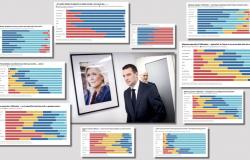Investing.com – The U.S. dollar edged higher in early European trade on Friday, en route to its second straight quarterly gain, as the euro slipped and the Japanese yen remained in intervention mode.
At 04:00 ET (09:00 GMT), the, which tracks the greenback against a basket of six other currencies, traded 0.1% higher at 105.705, on course for a 1.5% increase for the second quarter.
GET 35% + 10% off at InvestingPro! The summer sales have started, and we are offering a -35% reduction on the 1-year InvestingPro subscription, with an ADDITIONAL -10% discount for our readers! Join InvestingPro to equip yourself with professional tools and follow our AI-managed strategies to boost your stock portfolio and know which stocks to buy whatever the market conditions! CLICK HERE to benefit from the rate reserved for our readers (-35% and an additional -10%!) and take your investments to the next level!
The dollar gains after the debate; PCE data expected soon
The greenback was in strong demand, expected to be the second consecutive quarterly gain, as markets have reduced expectations of US interest rate cuts over the past six months.
The dollar index has posted gains of just under 5% since the start of the year.
That said, the Federal Reserve’s preferred measure of inflation, the Personal Consumption Expenditures (PCE) index, is due later in the session and is expected to show annual growth slowing to 2.6% in May.
While that figure is still above the Federal Reserve’s 2% medium-term target, it could pave the way for cuts later in the year.
“The market is not pricing in the first Fed rate cut until November and so there should be room for short-term US rates to fall as the focus shifts more directly to a rate cut in September,” analysts at ING (AS:) said in a note.
The dollar was also helped overnight by President Joe Biden’s disappointing performance in the first presidential debate on Thursday, boosting Republican candidate Donald Trump’s chances of winning the November vote.
“We view a potential Trump administration as more positive for the dollar, both through a looser tax policy and a more aggressive trade/tariff environment,” ING said.
Politics weighs on the euro
The pair edged higher to 1.2641, helped by data showing the UK economy expanded by 0.7% in the first three months of this year compared with the previous quarter, above the initial estimate of 0.6% growth.
On an annual basis, first-quarter gross domestic product grew by only 0.3% from a year earlier, above an initial estimate of 0.2%.
“It is encouraging that consumption appears to be the main driver of growth,” ING said. “However, we still expect the Bank of England to start cutting rates in August and will start signalling this in its speeches once the July 4 general election is over.”
The fell 0.1% to 1.0695 as political uncertainty ahead of French elections this weekend weighed on the euro.
The latest opinion poll published in the Les Echos newspaper on Friday indicated that France’s far-right National Rally party has further increased its forecast and could reach as much as 37% of the popular vote.
“The question for the market is whether a Le Pen government looks at the French bond market and starts abandoning some of its apparently unfunded tax cut plans – or whether it moves ahead,” ING added. .
Elsewhere, the number of jobless people in Germany rose more than expected in June, with growth of 19,000 in seasonally adjusted terms, above the 15,000 expected.
USD/JPY Briefly Crosses 161
In Asia, the s traded 0.1% higher at 160.95, after briefly breaking the 161.00 level earlier in the session.
The pair is now well above the levels that attracted government intervention in May. Although officials have maintained their verbal warnings, the movement in the USD/JPY pair suggested that no real intervention has taken place so far.
Tokyo consumer price index data also showed a slight pick-up in inflation. Although headline inflation rose, core inflation remained well below the Bank of Japan’s 2% annual target.
Low inflation has heightened doubts about the BOJ’s room to tighten monetary policy – a key factor behind the yen’s recent weakness.
The fell slightly to 7.2660, remaining near its highest level since November. The focus was now on key Chinese PMI data, due this weekend.







